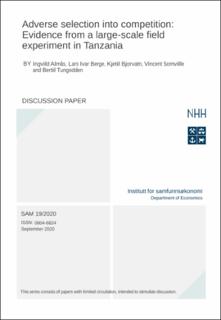| dc.description.abstract | An influential literature has shown that women are less willing to compete than men, and the gender gap in competition may contribute to explaining gender differences in educational choices and labor market outcomes. This study reports from a large-scale randomized controlled trial of a women empowerment program in Tanzania targeting young women at the end of secondary school. Combining the randomized controlled trial, a lab-in-the-field experiment and survey data, we provide evidence suggesting that the program caused adverse selection into competition: low performing women competed more, while there was no effect on the high performers. We provide a theoretical framework to illustrate an adverse selection mechanism that may contribute to explain why the program only affected the willingness to compete among low performers. Our results emphasize the importance of understanding sorting mechanisms and heterogeneous treatment effects in the design of policies and programs | en_US |
